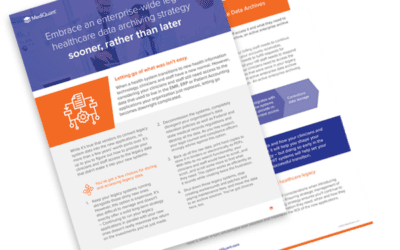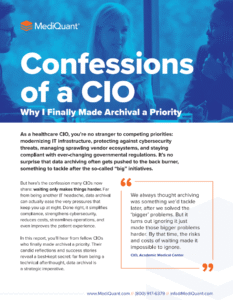Unlocking the Power of Legacy Data Archiving to Deliver Better Patient Care
Care Coordination

Patient Engagement and Satisfaction
Research, Innovation, and AI
Compliance, Benchmarking, and Audits
Data Cleanliness, Security, and Access
Let’s face it, old data is problematic. Storing it in an old system means keeping that system up and running, an expensive proposition. Migrating it means making decisions about how the migration will occur, where the data migrate to, and how much will be available to providers from within the EHR.
For many, the solution is an archive that’s contextually linked to the EHR, letting providers easily access older systems to retrieve patient data. Here are a few considerations regarding data archiving:
- Your legacy data may include errors, and the archiving process presents a great opportunity to clean it. Develop a strategy for finding duplicates, fixing errors, and purging data that is outside your retention policy.
- The archiving process matters, so make sure your archive partner will ensure your data won’t lose context, will support provider workflow, and is accessible to patients as needed.
- Interoperability is essential. Your archive should be robustly tied into your EHR, whether it’s via a traditional interface like HL7, APIs within your EHR, or middleware.
- Security is also essential. Your legacy data should be HITRUST certified, and users should only be able to access the data needed for their work.

More Thought-Leadership
Embrace an Enterprise-Wide Legacy Healthcare Data Archiving Strategy Sooner, Rather than Later.
When a health system transitions to new health information technology, clinicians and staff have a new normal. However, considering your clinicians and staff still need access to the data that used to live in the EMR, ERP, or Patient Accounting applications your...
Health Data Archiving Provides Financial Gains to Organizations
A full 85 percent of organizations who have retired legacy IT systems and opted for health data archiving report positive financial impacts, according to KLAS Research.A full 85 percent of organizations who have retired legacy IT systems and opted for health data...
Contact Us Today






